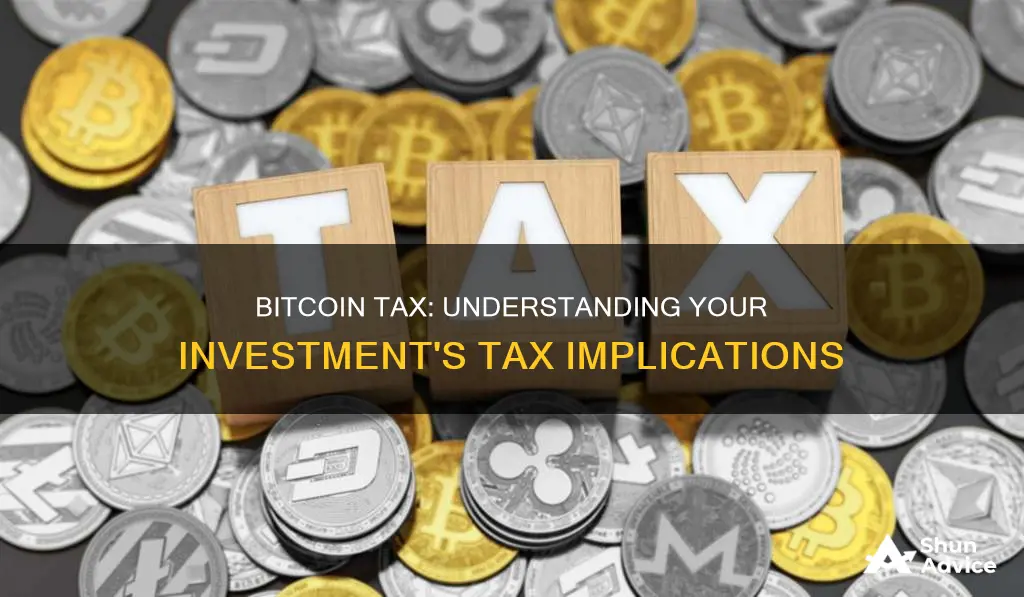
Bitcoin is a type of cryptocurrency, a virtual currency that can be used to buy goods and services. However, despite being referred to as a virtual currency, it is not considered a true currency in the eyes of the IRS. Instead, the IRS treats Bitcoin as property, and any gains or losses incurred from Bitcoin transactions are generally subject to capital gains taxes. The tax implications of buying, selling, or mining Bitcoin can be complex and depend on various factors such as the length of time the asset was held, the value of Bitcoin at the time of the transaction, and the taxpayer's income and filing status. It is important for individuals who engage in Bitcoin transactions to understand the tax consequences and keep accurate records to ensure compliance with tax regulations.
| Characteristics | Values |
|---|---|
| Taxable events | Selling digital assets for cash; trading one type of digital asset for another; using crypto as payment; mining or staking crypto; receiving airdropped tokens; getting paid in crypto; receiving interest or yield in crypto |
| Non-taxable events | Buying digital assets with cash; transferring digital assets between wallets or accounts that you control; gifting cryptocurrency (excluding large gifts that could trigger other tax obligations); donating cryptocurrency |
| Tax forms | Form 1040; Form 8949; Form 1099-MISC; Form 1099-B; Form 1099-K; Form 1099-NEC |
What You'll Learn

Capital gains or losses on sales of Bitcoin
Bitcoin is treated as an asset similar to property by the IRS and is taxed accordingly. When you sell a virtual currency you've held for more than a year, you must recognise any capital gains or losses on the sale. Any gain or loss is calculated based on the cryptocurrency's market value on the day and time you bought it (its basis).
The gains or losses recognised are subject to limitations on the deductibility of the taxpayer's capital losses. This tax legislation is determined by IRS Publication 544 (Sales and Other Dispositions of Assets). Capital gains are reported on Schedule D of a taxpayer's Form 1040.
In the broadest sense, gains and losses on the sale of Bitcoin are treated the same as other capital assets such as stocks, bonds, precious metals, or certain personal property. Short-term capital gains are taxed as ordinary income and assessed at the same tax rate as the taxpayer's salary or wages. Long-term capital gains are taxed at a rate that varies depending on the taxpayer's income.
The tax basis of Bitcoin used to determine your gain or loss is the cost for which the digital currency was obtained or its market price at the time it was acquired. For example, assume you acquired 100,000 Satoshi when Bitcoin traded at $20,000/coin. The cost basis of the acquisition would be $20. In this example, if the Bitcoin was sold for $25 more than a year later, a $5 taxable capital gain would occur. If it was sold for $14, a $6 loss would be made. If you sold it for $25 six months later, $5 in taxable income would need to be reported.
The tax basis of Bitcoin becomes more complicated as less straightforward transactions occur. For example, an investor may receive airdropped tokens or tokens in exchange for a service at no cost. In most of these situations, the tax basis of the airdropped digital currencies would be equal to the fair market value at the time of acquisition. This tax treatment is similar to that of stocks and bonds.
If you sell Bitcoin for less than you bought it for, the amount of the loss can offset the profit from other sales.
Exploring Bitcoin Investment: What's the Real Deal?
You may want to see also

Tax implications of Bitcoin mining
Bitcoin mining is considered a taxable event in most countries, including the US, the UK, Australia, and Canada. The tax implications of Bitcoin mining depend on whether the activity is classified as a hobby or a business.
Hobby Mining
If you are mining Bitcoin as a hobby, the rewards are taxed as income upon receipt. This means that you will pay income tax based on the fair market value of the Bitcoin on the day you received it. In the US, the ordinary income tax rate ranges from 10% to 37% depending on your tax bracket. Hobby miners are generally not allowed to claim deductions for expenses such as electricity and hardware costs. However, there may be exceptions for certain costs, such as home office deductions.
In the US, hobby miners must report their mining income on Form Schedule 1 (1040), line 8 as other income. Any capital gains from selling, swapping, or spending mined coins must be reported on Form Schedule D (1040) and Form 8949.
Mining as a Business
If you are running a Bitcoin mining business, you may be subject to self-employment tax and can deduct business expenses related to mining. This includes equipment expenses, repair costs, office space, home office deductions, and other ordinary and necessary business expenses.
In the US, mining businesses must report their income on Form Schedule C (1040). Capital gains or losses from the disposal of mined Bitcoin are calculated by subtracting the asset's cost basis (the value at the time of mining) from the sale price. If there is a gain, you will pay capital gains tax; if there is a loss, you can use it to offset your gains through tax-loss harvesting.
Other Considerations
It is important to keep detailed records of your Bitcoin mining activities and transactions to ensure compliance with tax regulations. The IRS and other tax authorities are increasingly focused on crypto tax evaders and are working with contractors and exchanges to track transactions and identify individuals. Failing to report income or capital gains from Bitcoin mining can result in penalties, fines, and potential prison time.
Bitcoin Investment: Worth the Risk?
You may want to see also

Tax implications of Bitcoin swaps
The US Internal Revenue Service (IRS) treats Bitcoin and other cryptocurrencies as property, not currency, for tax purposes. This means that exchanging one cryptocurrency for another is a taxable event, and you must report any gains or losses to the IRS. Even if no cash changes hands, you may be liable for income tax on any profits made from the exchange.
The tax implications of Bitcoin swaps depend on whether the swap results in a capital gain or a capital loss. If the Bitcoin is held for less than a year before swapping, any gains are considered short-term capital gains and are taxed at your ordinary income tax rate. If the Bitcoin is held for more than a year, the gains are considered long-term capital gains and are taxed at a lower rate.
If the Bitcoin swap results in a capital loss, you must still report it on your taxes, but there is no tax payment required as there is no capital gain for the government to tax. However, you may be able to write off some or all of your losses against other capital gains.
It is important to note that the tax treatment of cryptocurrency swaps can be complex and may depend on various factors such as the specific cryptocurrencies involved, the timing of the swap, and your individual circumstances. Therefore, it is always recommended to consult with a tax professional to ensure compliance with the applicable tax laws and regulations.
- The IRS does not consider Bitcoin and other cryptocurrencies to be "like-kind property", so exchanges among them are not eligible for tax-free exchange treatment under Section 1031.
- The cost basis of the Bitcoin, or the original purchase price, is important for calculating any capital gains or losses resulting from the swap.
- If you receive Bitcoin as payment for goods or services, this is also a taxable event and must be reported as business income.
- Cryptocurrency mining rewards are generally taxed as ordinary income, unless the mining is part of a business enterprise, in which case they may be taxed as business income.
The Crypto Investment: Which Coins are Worthy?
You may want to see also

Tax implications of gifting Bitcoin
Gifting Bitcoin or other cryptocurrencies can be a convenient way to share your wealth with friends and family. However, it's important to be aware of the tax implications of gifting Bitcoin to ensure you're compliant with regulations. Here are the key points to consider regarding the tax implications of gifting Bitcoin:
Tax Implications for the Gifter
Gifting Bitcoin is generally not considered a taxable event for the giver. In other words, you don't have to pay taxes on the amount of Bitcoin you gift. However, if the value of the Bitcoin you gift exceeds a certain threshold, you may have reporting obligations. In the US, for the 2023 tax year, the gift tax exemption was $17,000 per recipient, and this limit is expected to rise to $18,000 in the 2024 tax year. For gifts made in 2022, the annual gift tax exemption was $16,000. It's important to note that this limit applies per recipient, and you can give this amount or less to multiple individuals without triggering tax obligations. However, if you gift Bitcoin or other cryptocurrencies above this threshold to a single recipient, you may be required to file a gift tax return (IRS Form 709) to report the gift to the IRS.
Tax Implications for the Recipient
Receiving Bitcoin as a gift is also typically not a taxable event for the recipient. They don't need to report it as income on their tax return and are not taxed on the value of the gift upon receipt. However, when the recipient eventually sells or disposes of the gifted Bitcoin, they will likely incur capital gains taxes. The recipient's cost basis for calculating capital gains or losses depends on whether the Bitcoin's value has increased or decreased since it was gifted. If the Bitcoin's value has increased, the recipient's cost basis is generally the giver's original cost basis. If the value has decreased, the recipient's cost basis is the lower of the giver's cost basis or the fair market value of the Bitcoin at the time the gift was given. It's important for the recipient to keep detailed records of the donor's original cost basis, acquisition date, and the fair market value of the Bitcoin on the date of the gift to accurately calculate their tax liability when they dispose of the gift.
Additional Considerations
While gifting Bitcoin can provide tax benefits, it's important to be mindful of potential tax implications in certain situations. For example, if you're gifting Bitcoin to a US citizen spouse, the gift is generally not reportable and won't contribute to your lifetime gift tax exemption. Additionally, donating Bitcoin to a registered charity or nonprofit organization may provide tax benefits in the form of deductions. Be sure to consult with a tax professional or advisor to understand the specific rules and regulations applicable to your situation.
Who's Betting Big on Bitcoin Globally?
You may want to see also

Tax implications of receiving Bitcoin as payment for goods or services
The tax implications of receiving Bitcoin as payment for goods or services depend on the nature of the transaction and the taxpayer's circumstances. Here are some key points to consider:
- The Internal Revenue Service (IRS) treats Bitcoin and other cryptocurrencies as property for federal tax purposes. This means that Bitcoin can be classified as business property, investment property, or personal property, depending on the context in which it was acquired and used.
- If you receive Bitcoin as payment for goods or services, you must include its fair market value (measured in US dollars) as income on the date it was received. This value is determined by converting the virtual currency into US dollars using the listed exchange rate on platforms like Coinbase.
- If the Bitcoin received as payment is later exchanged for other property, you will recognize a gain or loss. A gain occurs when the fair market value of the property received exceeds your basis in the Bitcoin, while a loss occurs when the fair market value of the property received is less than your basis.
- If the Bitcoin was held for investment purposes for more than a year before being exchanged, any gain will be subject to preferential long-term capital gain rates.
- It is important to maintain detailed records of your Bitcoin transactions, including the date of receipt, the currency's fair market value at the time, and the purpose for which you are holding the currency.
- The tax implications of Bitcoin transactions can be complex, and it is recommended to consult with a tax professional or accountant familiar with cryptocurrency tax laws to ensure accurate reporting and compliance.
Litecoin Investment Safety: Is It a Secure Bet?
You may want to see also
Frequently asked questions
Buying Bitcoin is not a taxable event. However, selling Bitcoin is a taxable event and you will need to pay capital gains tax. If you sell Bitcoin for less than you bought it for, the amount of the loss can offset the profit from other sales.
You need to determine the cost basis of the Bitcoin, which is the total amount you paid to acquire it, including any fees. Then, subtract the cost basis from the Bitcoin's fair market value at the time of the transaction to get the capital gains or loss.
You will need to report your transactions on your tax return using various tax forms, including Form 8949, Sales and Other Dispositions of Capital Assets, and Schedule D.
Yes, certain crypto transactions are tax-free. For example, buying crypto, donating crypto, and gifting crypto are generally not taxable events.







